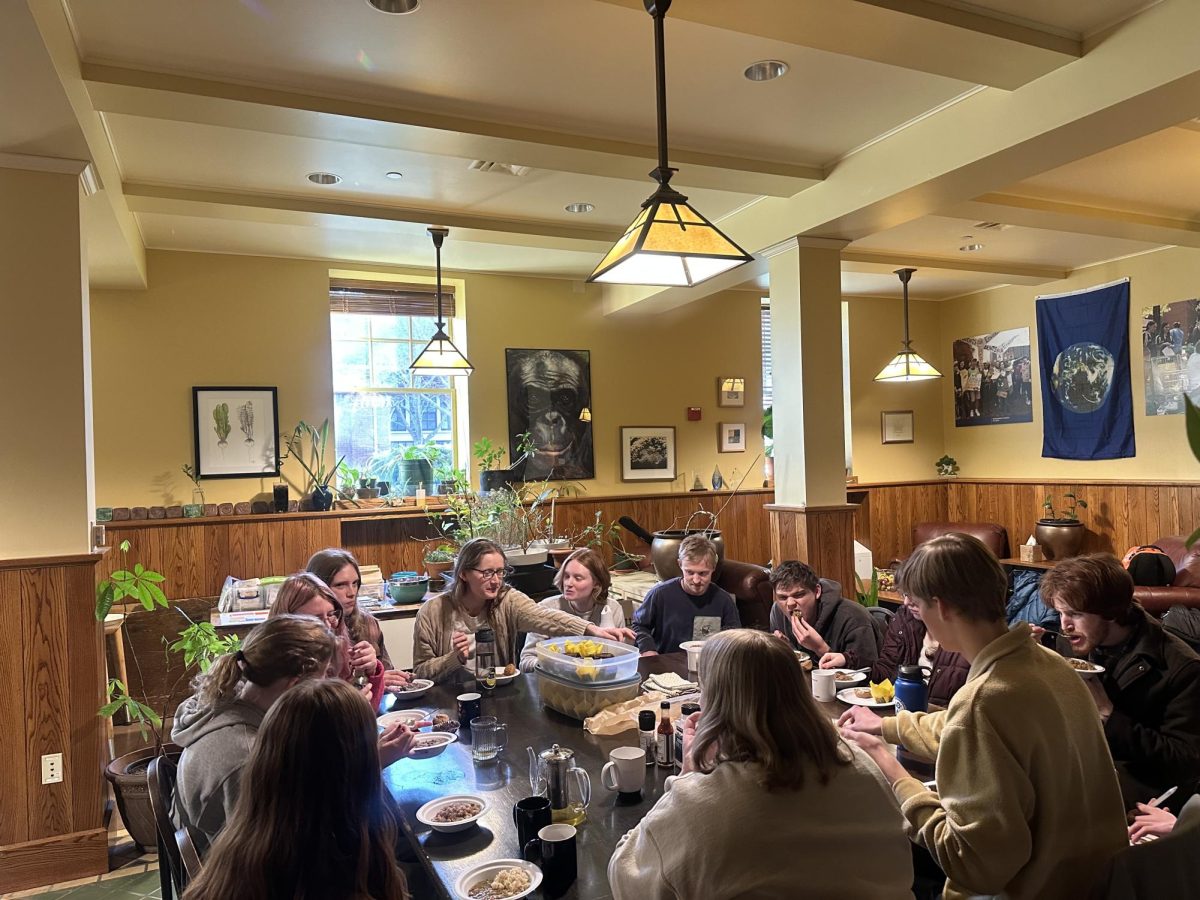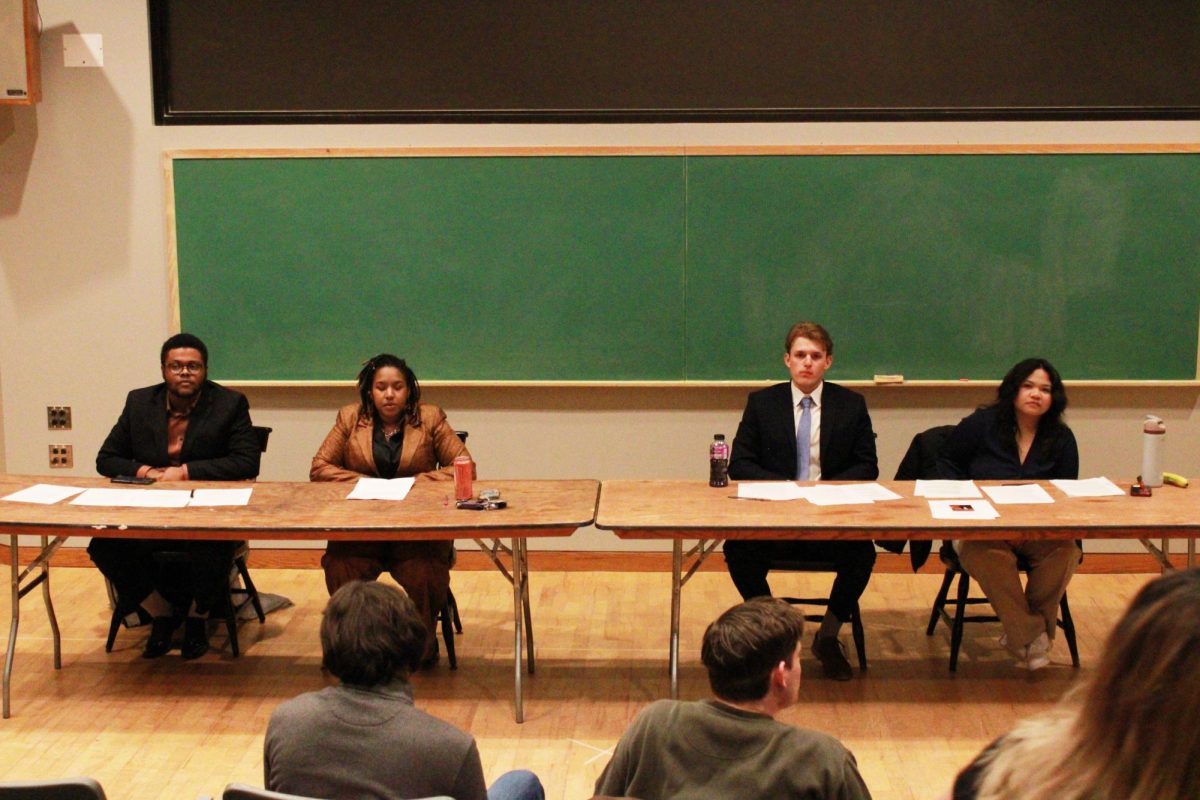By SAMANTHA HUNGERFORD
hungers@allegheny.edu
The College Democrats and the College Republicans came together to debate prominent national issues Monday night in the Campus Center.
The topics on the table were the Supreme Court’s ruling in favor of Citizens United, immigration policies and tax cuts.
The College Democrats were represented by Kenneth Hall, ’12, Brendan Helt, ’14, and Craig Hayes, ’14, while the Republicans were represented by Clay Moran, ’13, Paul Roveda, ’13, and Derek Dye,’ 11.
The debate opened with the question of whether or not the Supreme Court was correct in their ruling in favor of Citizens United, a decision that will allow political parties to accept funds from individuals and corporations.
The Democrats opened the debate with Hayes, who stood against the decision, questioning its constitutionality and noting its effects on the 2010 midterm elections. He also stressed that money does not equate free speech and that donors outside parties could sway the direction of campaigns.
“Unprecedented outside, often anonymous spending on political candidates is a threat to constituents across the country,” said Hayes. “If voters don’t know where outside money is coming from, how can they trust candidates to do what they say they’re going to do?”
Hayes concluded by pointing out the use of outside funds in Republican campaigns during the 2010 midterm elections.
“I would argue that if money did not affect the Republican Party as much as it does, we’d be hearing a different tune from the right,” he said.
Moran, representing the Republicans, argued that the interests of political candidates and the corporations funding them don’t influence each other because of the nature of corporations, whose primary interest is in making money, not achieving political power.
“Unless the corporation has a keen political interest, they will avoid endorsements just because they could make enemies in the future,” said Moran.
He argued that the bill supports First Amendment rights because corporations represent the voices of a group of individuals. Additionally, he noted that allowing corporations to fund campaigns also allows labor unions, groups that traditionally side with the Democratic Party, to do the same.
“Regardless of whether [a person is] a member of a labor union or a member of the corporation, they have the constitutional right to free speech,” Moran said. “Free speech […] can also be expressed in the form of funding a certain candidate.”
The only instance when both parties were able to find common ground was when the debate turned to the topic of illegal immigration.
Initiatives such as strengthening border control, providing employers with resources to verify green cards and increasing punishment for those who smuggle and employ illegal aliens were solutions that both parties suggested to alleviate the problem.
The parties also supported the promotion of economic development in Latin America and bettering education for immigrant children.
Agreement between the parties, however, ended at the topic of tax cuts.
Hall, speaking for the Democrats, opposed the extension of the Bush the tax cuts which will expire at the end of the year. He stressed that in order to reduce the U.S. deficit, tough choices must be made by the government and that eliminating tax cuts is the first step to fiscal responsibility.
“The Republicans have run their whole campaign on the importance of reducing the federal deficit. If we were to allow all the tax cuts to expire across the board it would reduce the deficit by one quarter,” said Hall. “It is a quick and easy way to send a powerful message to the world that we are serious about reducing our deficit.”
Hall also stated that the tax cuts are causing an increased disparity between the rich and poor in the U.S.
Roveda took this question for the Republicans, expressing concerns that allowing the tax cuts to expire would stunt economic growth.
Small business owners, who are the primary job creators in the U.S., would also suffer from an increase in taxes, Roveda said.
“[Elimination of tax cuts would] decrease investment, reduce work incentives, stifle entrepreneurialism and reduce economic growth,” Roveda said. “Lawmakers should remember that America cannot tax itself into growth and prosperity.”
Student responses to the debate were mostly positive, though several people noted aspects that could have been approached differently.
“I think a lot of times when we get into economic discussions we forget the actual worker, the conditions, the wages that they have to live with,” said Chris Plano, ’12, who attended the debate.
Other students, such as Nick Diana, ’13, said that while the debate was civil and bipartisan, it wasn’t very dynamic.
“I wish they would’ve addressed each others’ points more,” he said. “I felt like it was two people giving separate speeches, not so much a debate.”









